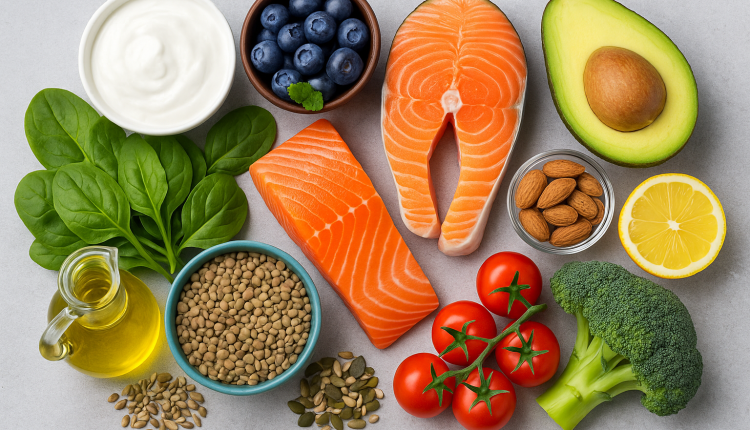In an age where health-conscious living is gaining momentum and chronic diseases are on the rise, the concept of functional foods has become more than a buzzword — it’s a transformative way of thinking about nutrition. These aren’t exotic superfoods you’ve never heard of or expensive powders advertised on wellness blogs. Functional foods are everyday ingredients that go beyond basic nutrition to deliver health benefits that can prevent disease, boost immunity, and improve overall well-being. The true magic lies in what you’re already cooking — if you know how to use it.
What Are Functional Foods?
Functional foods are ingredients that offer benefits beyond their nutritional content. That means they don’t just fuel your body; they actively help your body function better. They include:
- Whole grains like oats and barley that lower cholesterol.
- Fatty fish such as salmon, which is rich in omega-3s for brain and heart health.
- Berries that are loaded with antioxidants to fight inflammation.
- Fermented foods like yogurt, kimchi, and kefir that promote gut health.
- Leafy greens full of vitamins, fiber, and anti-cancer compounds.
These foods are not new. They’ve been staples in traditional diets around the world for centuries — it’s just that modern science is now catching up to explain their power.
The Science Behind Functional Foods
What makes functional foods different is their bioactive compounds — chemicals naturally found in foods that have a positive impact on health. These compounds include:
- Flavonoids in fruits and vegetables that reduce oxidative stress.
- Probiotics in fermented products that balance gut microbiota.
- Fiber that supports digestion, lowers blood sugar, and improves heart health.
- Phytosterols in nuts and seeds that reduce LDL cholesterol.
Numerous studies link these compounds to reduced risks of chronic diseases such as type 2 diabetes, cardiovascular issues, obesity, and even some cancers. For example, the Mediterranean diet — rich in olive oil, fish, vegetables, and legumes — has consistently been linked to longevity and decreased risk of Alzheimer’s disease.
Functional Eating for Common Health Goals
1. Boosting Immunity
Eating garlic, ginger, mushrooms, and citrus fruits daily can support your immune system. These foods enhance the production and activity of white blood cells and contain antiviral and antibacterial compounds.
2. Improving Gut Health
The gut is often called the “second brain,” and for good reason. A healthy gut influences mood, metabolism, and immunity. Fermented foods like sauerkraut and miso feed good bacteria in your intestines, while fiber-rich foods like apples, legumes, and flaxseeds promote regular digestion and support gut lining.
3. Managing Stress and Mental Health
Certain foods can influence serotonin production and cortisol levels. Omega-3 fatty acids found in fatty fish have anti-inflammatory effects that benefit the brain, while magnesium-rich foods like spinach, pumpkin seeds, and avocados help regulate mood and reduce anxiety.
4. Supporting Heart Health
Foods high in potassium (bananas, sweet potatoes), magnesium (dark chocolate, nuts), and healthy fats (olive oil, almonds) keep blood pressure in check and reduce the risk of arterial plaque buildup.
Debunking the Superfood Myth
The term “superfood” is often misleading. It’s not about one magical ingredient, but about building balanced, diverse meals over time. Açaí bowls and spirulina shots might be trendy, but lentils, broccoli, garlic, and brown rice are just as — if not more — powerful when eaten consistently. Functional eating isn’t about perfection or expensive trends; it’s about consistency and smart choices.
Creating a Functional Food Routine
Here are some simple ways to make functional foods part of your daily life:
- Start with breakfast: Swap sugary cereals for oatmeal topped with berries and chia seeds.
- Add greens to every meal: Stir spinach into scrambled eggs, blend kale into smoothies, or toss arugula into pasta.
- Choose whole over processed: Replace white rice with quinoa, white bread with whole-grain, and soda with infused water or kombucha.
- Snack smart: Keep nuts, fruit, or Greek yogurt handy instead of processed snacks.
- Spice it up: Use turmeric, cinnamon, and cayenne not just for flavor but also for their anti-inflammatory properties.
Functional Food Is Prevention, Not Cure
While functional foods can play a major role in preventing disease, they are not a substitute for medical treatment. However, their daily consumption is a proactive, empowering way to take control of your health and potentially reduce reliance on medication.
Final Thoughts
Functional foods are more than a trend — they’re a return to a wiser, more intentional way of eating. They reconnect us with the idea that food is not just sustenance, but a cornerstone of wellness. With every bite, you can make a choice that supports your body’s needs. It doesn’t take a fancy supplement or strict diet — just a little knowledge, fresh ingredients, and the will to nourish yourself from the inside out.


